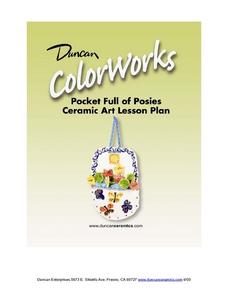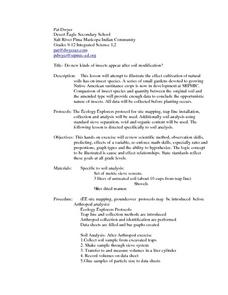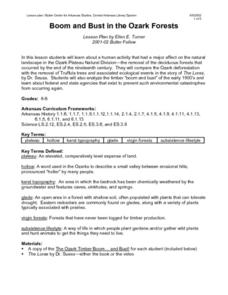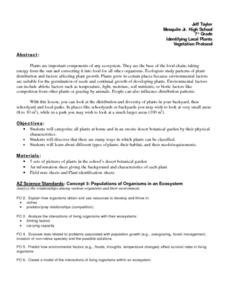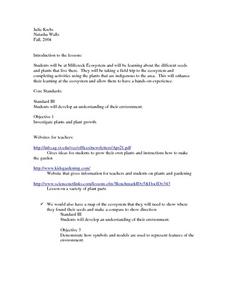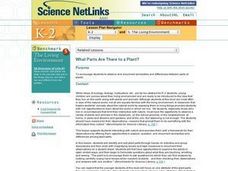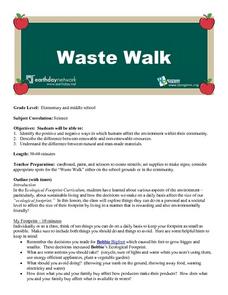Chicago Botanic Garden
Personal Choices and the Planet
How big is your footprint? Activity three culminates the series by having groups complete carbon footprint audits with people in their schools and/or around the districts. Groups then gather their data, create a presentation including...
Curated OER
Pocket Full of Posies: Ceramics
After studying the plant or flower life cycle, have the class create a basket of flowers out of clay. They hone their ceramics skills while they push, pull, then paint clay to look like flowers they've seen in nature. There are several...
Curated OER
Do new kinds of insects appear after soil modification?
Students explore and experiment with the concept do new kinds of insects appear after soil modification. They assess and review scientific methods of observation, predicting, variables, math skills, ratio, proportions, graphs and the art...
Curated OER
Acid Rain
Simulated acid rain, a dilute sulfuric acid solution, needs to be prepared for this demonstration. After a condensed lecture on acid rain, you will apply the solution to a sample of granite and a sample of limestone. Your young...
Curated OER
Boom and Bust in the Ozark Forests
Here is a hard-hitting, cross-curricular lesson on the effects that the deforestation of the Ozark forests in the 19th century had on the people, animals, and ecosystems of the area. The Dr. Seuss book The Lorax is used as a way of...
Chicago Botanic Garden
Introducing Ecosystem Services
Purifying air and water, providing soil in which to grow crops, and moving water through its natural cycle are all services an ecosystem provides that benefit humans. Lesson four in a series lets learners explore and discuss the value of...
Chicago Botanic Garden
Personal Choices and the Planet
The last activity in the series of four has individuals determine steps they can take to reduce their carbon footprints and then analyze their schools' recycling programs. Through a sustainability audit, they identify how and where their...
Chicago Botanic Garden
Introducing Ecosystem Services
Ecosystems provide many things humans not only use but also need in order to survive. The last instructional activity in the series of seven introduces scholars to the idea of ecosystem services, that ecosystems provide humans with many...
Curated OER
U.S. History: Antebellum Heroes and Villains
Eighth graders research and write reports on key figures of the Antebellum Period. The projects also include pictures, bibliographies, and timelines about their assigned figure. In addition, 8th graders present oral reports to classmates.
Curated OER
The Greening of Mars: The Changes Necessary to Sustain Life on Mars
Fifth graders discuss the currents conditions on the planet of Mars. In groups, they work together to develop a mechanism that allows for a balanced ecosystem to survive on the planet. After presenting their ideas to the class, they...
Curated OER
COMPOSTING: WHY BOTHER?
Students explore the composting process and participate in a contest to make the most compost the fastest from the school's kitchen and yard waste.
Curated OER
Ecosystem Field Trip
Young scholars investigate the different seeds and plants that are part of the Millcreek ecosystem. They take a field trip to the ecosystem and complete activities using the plants that are indigenous to the area.
Curated OER
The Queen's Empire
Learners conduct Internet research on a variety of ant species and their habitats. They have an opportunity to observe ants in their environment. Areas of interest might include ant identification, colony life, the ant life cycle, and...
Curated OER
What Parts Are There to a Plant?
Students identify and sort plant parts through hands-on activities and group discussions and then work with magnifying lenses and tape measures to document their observations on a student sheet.
Curated OER
The Great Pollinators
Young scholars discover the reproductive parts of a plant. In this biology lesson, students identify and categorize several different plants they dissect in class. Young scholars record their information using a data chart.
Curated OER
Rain Forests
Middle schoolers investigate claims of medicinal plants found in the rain forest. In this research skills lesson plan, students examine the validity of Internet sources as they visit websites in search of information about rain forest...
Curated OER
Creating an Experimental Design
Students research the damage to the environment by certain plant species. They create an experimental design which they test how these species take over certain habitats. They share their information with the class.
Curated OER
Fish Parasite Survey
Pupils count nematodes, cestodes and crustaceans on approximately one-hundred and fifty fish. They fill out autopsy reports for external and internal parasites then complete and discuss guide questions to make inferences about parasite...
Curated OER
Fish Parasite Survey
Learners survey and dissect as many fish as possible. They count nematodes, cestodes and crustaceans on the fish, fill out autopsy reports, and transfer data to a chalkboard data table. Students graph the results of the entire class...
Curated OER
Where are the Dinosaurs?
Students find the similarities of dinosaurs and the animals of today. In this dinosaurs lesson, students understand why dinosaurs have become extinct. Students research and create dinosaur dioramas and finger puppets.
Curated OER
What Parts Are There to a Plant?
Students explore botany by completing plant science worksheets. For this plant anatomy lesson, students examine real vegetables in class using magnifying glasses. Students identify the plants anatomy and complete worksheets discussing...
Curated OER
Environment: Waste Walk
Students assess the positive and negative affects of humans on the environment. The lesson explores ways in which individuals and societies can reduce the negative impact on the environment. By taking a "waste walk" around their campus,...
Curated OER
This Stuff Makes Me Sick
Students participate in a lab showing the effects of pesticides on Lumbriculus variegatus. Several extensions and variations are also included in this lesson including one which relates the experiment to how pesticides enter our drinking...
Curated OER
What is a Pest?
Students investigate whether rabbits should be considered pests even though they make good pets. They extend this to determine what, when, and where other organisms are considered to be pests, and examine why the concept of a pest is a...



